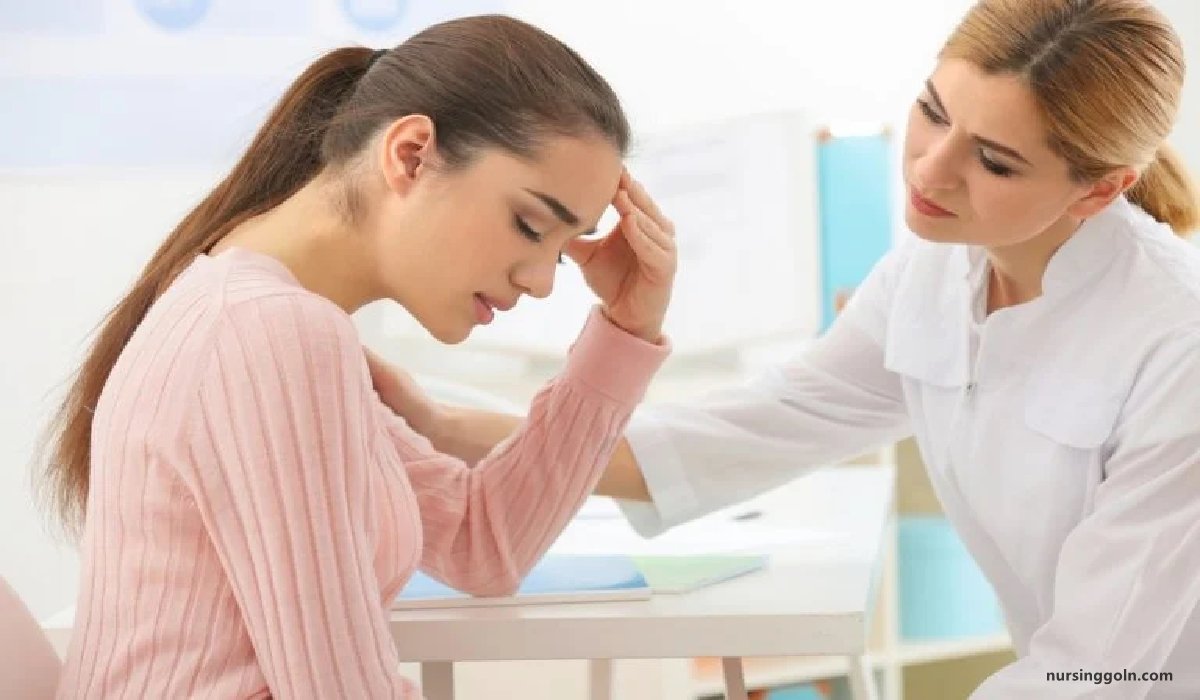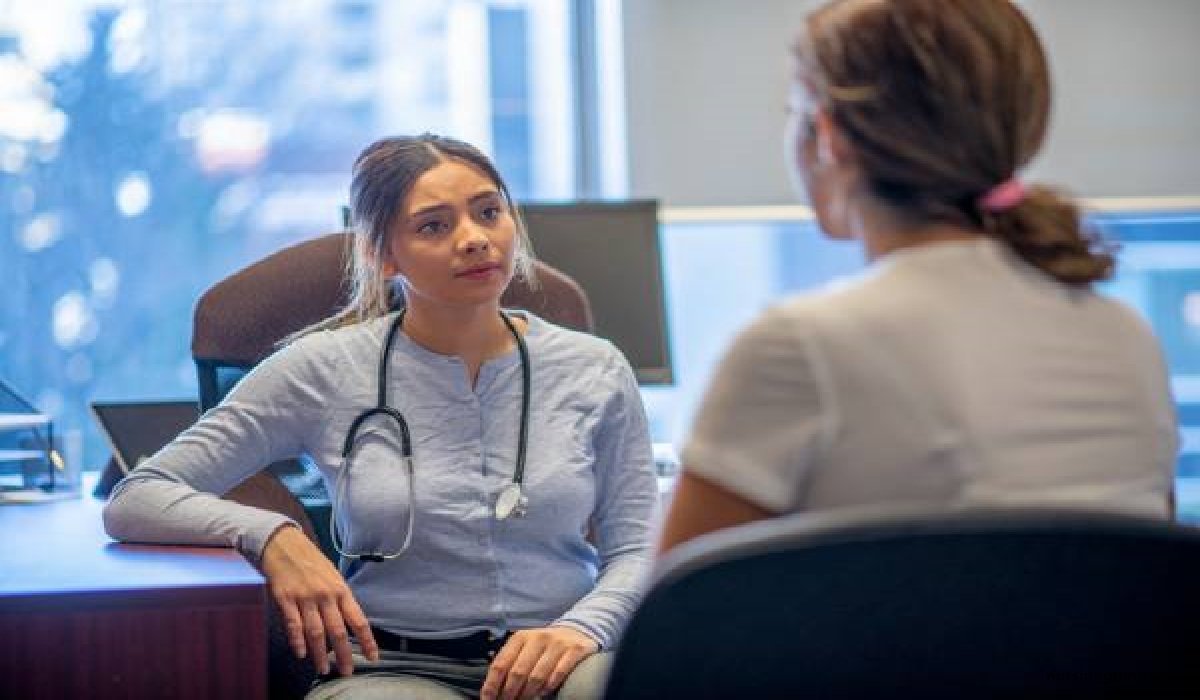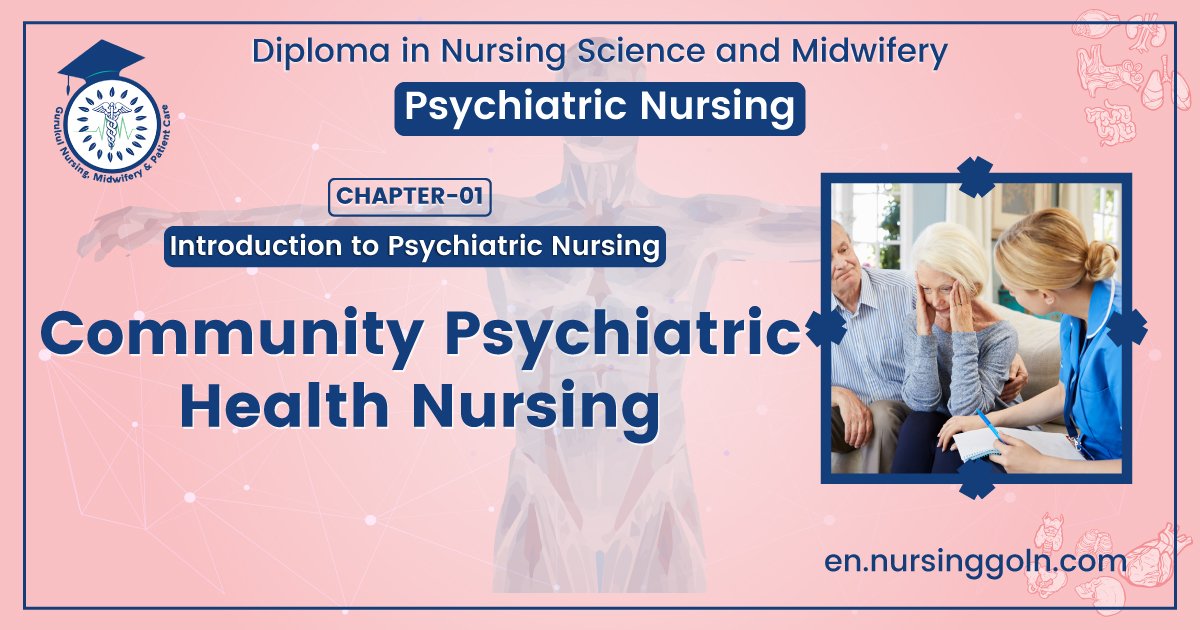Community psychiatric health nursing – This book covers the entire syllabus of “Psychiatric Nursing” prescribed by the Universities of Bangladesh- for Basic and diploma nursing students. We tried to accommodate the latest information and topics. This book is an examination-friendly setup according to the teachers’ lectures and examination questions.
At the end of the book previous university questions are given. We hope in touch with the book students’ knowledge will be upgraded and flourish. The unique way of presentation may make your reading of the book a pleasurable experience.

Community psychiatric health nursing
Community mental health:
Community mental health is a decentralized pattern of mental health, mental health care, or other services for people with mental illnesses. Community-based care is designed to supplement and decrease the need for more costly inpatient mental health care delivered in hospitals.
Community mental health care may be more accessible and responsive to local needs because it is based in a variety of community settings rather than aggregating and isolating patients and patient care in central hospitals.
[Ref: www.encyclopedia of mental disorders/]
Or,
“To promote, maintain and conserve the health of population aggregates in the community with emphasis on mental health”.
[Ref: BT Basavanthapa]
Or,
“The process of involving raising the level of mental health among people in a community and reducing the number of cases suffering with mental illness”.
[Ref: K. Lalitha/1/]
Define community psychiatry
Community psychiatry:
The branch of psychiatry that develops and maintains organized programmes for the promotion of mental health, prevention and treatment of mental disorders and the rehabilitation of the psychiatric client.
[Ref: KP Neeraja/I/Vol-1/3611]
Basic things required for community mental health care:
1. Treatment close to the patient’s home.
2. Comprehensive services.
3. Multi-disciplinary team approach.
4. Continuity of care.
5. Consumer participation.
6. Program evaluation and research
[Ref: S Nambi/24/1711]
Essential aspects of community psychiatry:
1. There should be continuity of care.
2. The available services are to be integrated
[Ref: S Nambi/2/171]
Components of community psychiatry:
1. Promotion of positive mental health.
2. Prevention of mental illness
[Ref: S Nambi/24/171]
Define community mental health nurse
Community mental health nurses will utilize the systematic and scientific knowledge of psychiatric nursing, to render psychiatric mental health care services (prevention of mental illness, promotion of mental health, health maintenance, curative and rehabilitative and restorative care, continuity of care, follow-up and referral services and crisis intervention services) to the needy or focused groups at their doorsteps, (home) or as close as possible, where the client lives.
[Ref: KP Neeraja/P/Vol-1/353]
Community mental health nursing:
The application of knowledge of Psychiatric Nursing in preventing, promoting and maintaining mental health of the people to help in early diagnosis and care and to rehabilitate the clients after mental illness.
[Ref: Bimala Kapoor, 20021]
Scope of community mental health nursing:
The mental illness will be ranging from severe, disabling to less incapacitating and long term in nature. Mental illness is prevalent in all societal segments. Community Mental Health Nurses will apply systematic, scientific knowledge to adopt nursing process in rendering care to the mentally ill. Varied community facilities are available to provide mental health care for total population.
[Ref: KP Neeraja/P/Vol-1/354]

Aims/goals/importance of community mental health nursing:
1. To provide preventive, promotive mental health services; health maintenance services in the community
2. To implement continuity of care, follow-up services, and rehabilitative services for needy clients
3. To screen population at risk and provide necessary counseling services and referral to psychiatric units
4. To mobilize family support systems in rendering care to the client after discharge
5. To provide crisis intervention services
6. To develop, innovative approaches in rendering primary mental health care services
7. To assist the individuals to develop a sense of independent living
8. Organizes mass health awareness campaigns
9. Provision of social learning experiences
10. Renders comprehensive mental health care services and focus group services,
11. Consultation and mental health education services will be provided to the focus groups
12. Arranges training programmes, workshops for school teachers, community leaders in diagnosing behavioural problems among all age groups and assessing mental health status of individuals
13. Integrated, balanced services will be provided
14. Care managers ensure long term care
15. Encourages community members to participate actively, wholeheartedly support for the needy group or population. myfinumato
16. Community Mental Health team members will participate in research activities
17. In selected sites (other than Health centres), e.g. schools, churches, youth centres, temples, mosques, etc. also the Community Mental Health will be practiced
18. Protect the clients from residual effects of mental illness
19. Encourages the support systems to provide situational support to the clients in crisis situations
20. To reduce the admission of clients in psychiatric institutions by providing care at home.
(Ref: KP Neeraja/T/Vol-1/355/)
Role of nurses in community mental health services:
1. Liaison Role:
Nurses will be connecting links, bridges the gaps between clients and family members; with family and health care professionals; between community welfare agencies or resources; and families, thus acts as a supporting system for clients and their families.
2. Consultant Role:
Advises family and other community resources about the level of support and care required for a specific group.
3. Practitioner or Clinician Role:
Renders direct nursing care to the clients within the community. Nurses has to accept the clients as they are; assists the client to develop coping abilities that promote psychological functioning. Nurses will identify the client with behavioral deviations, refer them immediately, and assist for therapeutic care, follow-up care and continuity of services.
4. Counsellor Role
Counsels the family members and help them in meeting the client’s needs at home and reduces the social stigma associated with it. Motivates the community to provide support to the families. Mobilizes the community agencies and its resources for welfare of mentally ill and provision of needed services.
5. Nurse Educator Role:
Organizes community awareness campaigns, specific focus to vulnerable groups on health promotion and health maintenance and community action. Teaching the community on the manifestations of illness, importance of early diagnosis; so that they will be able to observe and refer the cases immediately
6. Coordinator Role:
Psychiatric care is based on multidisciplinary team approach and the nurse has to coordinate between all team members; follows the therapeutic team members, advices and implements necessary care related activities informs to the team members whatever observations made, which may help for planning the therapeutic activities.
7. Therapeutic Role:
Plans and assists psychotherapeutic activities for improvement in the clients condition, encourages family members to utilize outdoor’s outdoor services In OPDs
8. Domiciliary Care:
Community Mental Health Nurses visits the houses and assess the health status, coping strategies utilized by the family members, psychological functioning of individuals; supportive systems, family coping index, ete. and plans, implements necessary care at their doorsteps. Treating minor complaints, psychotherapeutic sessions.
Counselling activities will be carried out in home settings and if needed, they will refer the cases. Plans and conducts research activities, minor projects, submits its reports to concerned authorities, publishes various articles; based on their observations and results plans and implements education activities; ongoing assessment of care programmes and provision of therapeutic care; helps the family members to adopts to the situation or strategies to encounter the problems etc. will be implemented.
9. Social Skills Training:
To develop effective interaction and communication abilities social skills training will be given, e.g., withdrawal cases; in de-addiction centres for recovering addicts, e.g. coping skills, adjustment skill, interaction and communication skills, interpersonal skills etc. Teaches relaxation exercises to the community.
10. Other Services:
➤ Assertiveness training will be given to improve self confidence
➤ Conducts group meetings; provides bereavement counselling
➤ Provision of care for the people in all age groups; carry out community outreach services.
➤ Provides crisis intervention services.
[Ref: KP Neeraja/I/Vol-1/355-357]

Programs for community mental health nursing:
1. Medication support:
➤ Order medications from pharmacy.
➤ Deliver medications to clients.
➤ Educate about medications
➤ Monitor medication complication
2. Financial management:
➤ Plan budget.
➤ Trouble shoots financial problems, for example, disability payments.
➤ Assist with bills.
➤ Increase independence in money management.
3. Counseling:
➤ Encourage problem solving approach
➤ Facilitate integration into continuous work
➤ Develop communication skills
➤ Coordinate a comprehensive rehabilitative approach.
4. Rehabilitation approach to daily living skills:
➤ Do grocery shopping & cooking
➤ Purchase & maintain clothing
➤ Facilitate access to transport
➤ Educate about legal rights
5. Family support:
➤ Provide crisis management
➤ Do counseling & Psycho education with family & extended family
➤ Coordinate with family service agencies
6. Entitlement:
➤ Assist with documentation
➤ Accompany clients to offices
➤ Manage food stamps
➤ Assist with predetermination of benefits
7. Health promotion:
➤ Provide preventive health education
➤ Provide reproductive counseling
➤ Maintain schedule visits
Role of nurses in mental health services:
1. Health promotion, which includes:
➤ Participation in health education programs
➤ Working with special groups, e.g. pregnant women, elderly, adolescents, etc.
➤ Helping the authorities in changing the attitude towards mental illness
2. Activity with the individual, the family or special groups preventive action and case finding
3. Ensuring continuity of care
4. Participation in studies with regard to community needs
5. Participation in rehabilitation programs.
[Ref: S Nambi/2/244]
